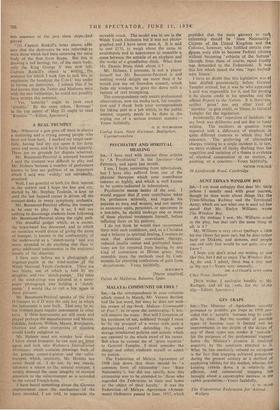• MALAYA: COMMUNIST OR FREE? .
Sitt,—he the correspondence in your columns which closed In March, Mr. Vernon Bartlett had the last word, but since he does not wish his review of my book Malaya: Communist. or Free? to re-open the controversy. I, too, will observe the truce. Nor will I complain of his treatment of me, saddened though I must be by the prospect of a writer with such a distinguished record defending (by some strange mischance) policies and actions which are opposed to the whole trend of his career. But when he accuses me of 'gross injustice' to General Templer, I must consider the charge and either vindicate myself or admit its justice.
The Federation of Malaya Agreement of 1948 laid down that there should be 'a common form of citizenship' (not 'State Nationality '), but did not specify how this citizenship was to be extended to 'those who regarded the Federation as their real home or the object of their loyalty.' It was the Federation of Malaya Agreement (Amend- ment) Ordinance passed in June, 1952. which
provided that the main gateway to suet) citizenship should be 'State Nationality.' Citizens of the United Kingdom and the Colonies, however, who fulfilled certain con- (*ions were able to become Federal citizens without becoming subjects of the Sultans' (though, from them of course, equal loyalty was demanded to the Federation). It was this law which raised the nine legal barbed• wire fences.'
I have no doubt that this legislation was at least drafted provisionally before General Templer arrived, but it was he who approved it and was responsible for it, and for passing it he claims credit in his speeches and the official Report to the Nation. It is therefore, neither 'gross' nor any other kind of ' injustice ' to give credit, or blame, to Cieneral Templer for the legislation.
Incidentally, the'' repetition of incidents' in my book was deliberate and not due to hasty writing. The incidents in question were repeated with a. difference of emphasis in quite different contexts to which they had , relevance. The preferring of alternative charges relating to a single incident is, in law, no more evidence of faulty drafting than the repetition and variation of a theme is evidence of slipshod composition in an oration, a painting, or a concerto.—Yours faithfully,
VICTOR PURCELL


































 Previous page
Previous page